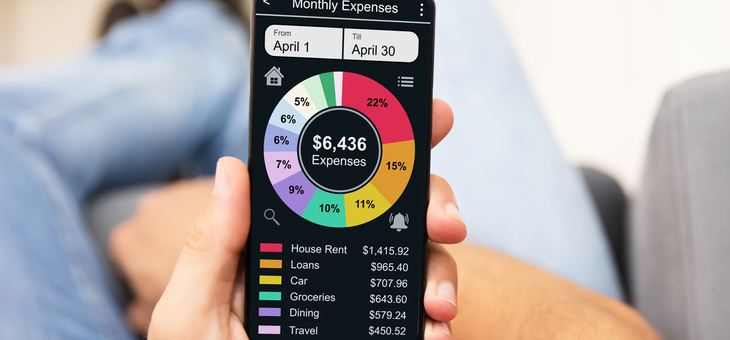When it comes to staying on top of your finances, many people these days are ditching paper and spreadsheets in favour of budgeting apps.
But what method is best? Well, with everything, there are always risks and pitfalls.
We speak to the experts so that you can decide for yourself.
So, what can budgeting apps do?
A lot.
Once you’ve downloaded it onto your device, you can import financial information directly from your bank, generate budget reports, graphs and charts.
Some apps will even flag upcoming bills, expenses as tax deductions, and compare financial products. For example, they could help you find a cheaper interest rate or energy provider.
Financial technology legal expert Grace Borsellino from the University of Western Sydney says budgeting apps can be life-changing for people who are struggling to manage their money.
“They give you a snapshot of what’s going on with your finances,” she says.
She says they can also end up saving you money.
“Your bank won’t say ‘hey, go with the other banks and save $300 a year,'” she explains.
“They’re not going to tell you about the competitors, whereas it’s in the interest of these apps to give you a great service or you will go elsewhere.”
Help! Bank-syncing, file-importing or manual entry?
The easiest way of using budgeting apps is to sync your bank account with the app so it gets the data automatically.
The easiest way, though, is not always the best or safest option (more on that later).
You can also export your financial data from your bank and import it into the app.
If you’ve got time on your side, importing your data or even manually typing it yourself can be more accurate because syncing can categorise spending incorrectly.
It can also be more secure.
Should I download a free or paid app?
This is a great question.
There are plenty of perfectly good free apps on the market but, in general, the paid apps have more features.
Another good thing to remember is that ‘free’ apps rarely end up being free in the true sense of the word.
That’s because you become the product, says Teresa Corbin, CEO of The Australian Communications Consumer Action Network (ACCAN).
“When anything is free, you have to consider the value to them. The value is the personal data they’re collecting on you and potentially selling,” she explains.
So check the privacy policy terms and conditions, even if it’s boring.
If you have any other questions, contact the company directly and ask them what data is being collected and what they are doing with it.
“Things like, are they also looking at your social media. Think about what they’re doing with that data, and if it could prejudice you later,” Ms Borsellino says.
“For example, could data they collect about you suggest you are a risk for a particular insurance policy?”
Okay, so is my information safe?
Not necessarily.
If there is a security or privacy breach with a third-party app, and money is taken from your account, your bank is not responsible.
That means you won’t get your missing money back. So speak to your bank first.
“The reality is that if you give out your login details, then you have no protection against fraud. So at the moment, if somebody hacks into your bank account, then there are protections against that, but if you’ve actually given your passwords away, then the bank will hold you responsible and not necessarily the fraudster,” explains Ms Corbin.
There’s also this new thing called Open Banking
The federal government recently launched a couple of initiatives that apply to banking apps.
They’re called Open Banking and the Consumer Data Right (CDR). They make it easier for you to share your financial information with accredited third parties, like budgeting apps.
At the moment, there are only 30 accredited providers. They must meet the ACCC’s accreditation criteria, as well as privacy and information security standards.
You might be surprised to learn your app is not among them, so it’s worth checking current providers.
Instead of handing over your actual banking password, you get a one-time password and the bank transfers your data on a secure connection, according to the federal government website.
But Ms Corbin is not convinced.
“The CDR, the open data regime, is not going to protect you,” she says.
Indeed, banks like NAB say if its customer shared their customer data and suffered a loss due to the actions of an accredited third party, it would not be financially liable under the CDR.
And Open Banking platform Frollo says it doesn’t assume liability for losses the ACCC could hold them responsible for.
As part of its accreditation process, Frollo has obtained insurance to cover losses in the event of anything like that happening (though it won’t say exactly how much it’s insured for).
So what’s the future look like for budgeting apps?
Ms Borsellino thinks it’s bright.
“Soon, most people will have the entry point into the internet through a budgeting app, so they don’t need to go independently onto different bank accounts or different energy providers to find a better deal,” she says.
But like most technology you use these days, she says you need to weigh up the potential risks against the benefits.
“Ultimately, I think budgeting apps help with financial inclusion,” she adds.
This is general information only. If you need personal advice, please seek out a professional.
 © 2020 Australian Broadcasting Corporation. All rights reserved.
© 2020 Australian Broadcasting Corporation. All rights reserved.
ABC Content Disclaimer

